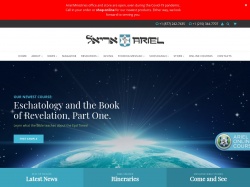The Relationship between the Torah and the Spirit
What is the relationship between the Holy Spirit and the Torah? Do these concepts work together? Or are they at odds with one another?
As we are amid the fifty-day counting period between Passover and Shavu’ot/Pentecost, I would like to discuss the importance of this connection. Typically, the Holy Spirit is understood as replacing the role of the Torah. Commenting on Romans 7:6, the ESV Study Bible is representative of the prevailing viewpoint. It says, “Christians are free from the Mosaic law and now enjoy new life in the Spirit.” From a Messianic Jewish point of view, the dominant view is problematic because the prophets spoke of a day when the Torah and Spirit would work together to advance God’s kingdom:
I will give you a new heart, and a new spirit I will put within you. And I will remove the heart of stone from your flesh and give you a heart of flesh. And I will put my Spirit within you and cause you to walk in my statutes and be careful to obey my rules. (Ezekiel 36: 26-27)
Ezekiel envisions the Spirit enabling Torah observance, not setting Christians free from it. In the prophets’ minds, the Spirit of God should lead to more Torah, not less of it. A fair question then is what to make of passages in the New Testament that appear to pit the Holy Spirit against the Torah. A good example is found in Romans 7:6:
But now we are released from the law, having died to that which held us captive, so that we serve in the new way of the Spirit and not in the old way of the written code.
Many commentators and teachers interpret Paul from a supersessionist viewpoint whereby the Holy Spirit’s role supersedes the role of the Torah/Law. In all fairness, Romans 7 is famously complex. However, it does not need to be understood in a supersessionist manner. The text can also be interpreted with an understanding of Paul’s affirmation of the Torah.
In the flow of the chapter, Paul’s concern is with sin and flesh and those things that keep Jews and Gentiles separate. Paul’s big point is that Yeshua’s death and resurrection and the work of the Spirit bring justification and newness of life to the Jew first and also the Gentiles. When Paul says, “We serve in the new way of the Spirit and not in the old way of the written code,” we can read this not in a replacement sense where the Spirit replaces or supersedes Torah. Rather, we can understand him to be affirming a positive relationship between Torah and Spirit.
Expansively, I understand Romans 7:6 to be saying the following.
Considering Yeshua’s death and resurrection, we now honor HaShem and keep the Torah in a new way, which involves an unprecedented era of Holy Spirit presence and activity. This is different from how we served the Torah/written code previously (aka the “old way”) when the Holy Spirit’s presence is not what it is now.
The “new” thing for Paul was not the elimination of the Torah. Rather, the new thing was the widespread presence of the Holy Spirit because of the dawning of the Messianic Era. There is a way of serving Torah that leads to captivity and death. Paul’s point is that the Spirit’s presence leads to a new and magnificent way of keeping Torah as appropriate for both Jewish and Gentile disciples of Yeshua.
This is one of the multiple examples in the New Testament where the Holy Spirit is interpreted as replacing the Torah. It is one of many significant components to replacement theology. However, there are alternate ways of understanding such texts that show the opposite—that indeed the Torah and Holy Spirit are prophetically designed to work hand in hand.
First Fruits of Zion



